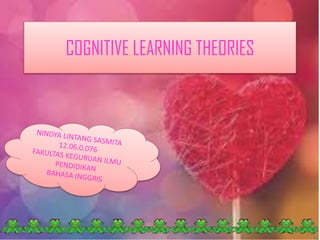
Cognitive learning theories
- 2. • Cognitive learning theories are based on how people think (Ormrod, 2008). The information processing model takes us through steps to explain how people learn. As information is acquired through one’s senses, it is transfered to working shortterm memory. If the information is rehearsed and practiced through elaboration, the information then moves to long-term memory. Once in long-term memory, There are three types of long-term memory: declarative (facts), procedural (how to do things), and episodic(events in your life).
- 3. CONCEPT MAP • Concept maps are a type of advanced organizers that allow students to create an outline or web of pertinent information. Concept maps are valuable web based tools that can allow students to synthesize their learning in a way the replicates the network model of memory. They allow students to outline the information in a way that is conceptually clear. They may then connect the new concepts with prior knowledge or schema
- 4. STRATEGY OF COGNITIVE LEARNING THEORIES • Summarizing and note taking is another strategy suggested. that supports the cognitive learning theory (2007, 119). Summarizing is the ability to delete, substitute and or keep information in order to record important information. Teachers may provide templates and ready-made notes for students to use. Pitler et al. suggest teaching and modeling summarizing as well as giving students opportunities to create their own notes
- 5. APPLICATION IN COGNITIVE LEARNING THEORIES • Application Cognitive Learning Theories can used : SUMMARIZING NOTE TAKING CONCEPT MAP
- 6. CHARACTERISTICS COGNITIVE LEARNING THEORIES • • • • CTL activation process of learning is the knowledge that already exists, meaning that what is learned can not be separated from the knowledge that has been learned, as such knowledge is to be obtained by students who have the complete knowledge relation to one another. Contextual learning is learning in order to acquire knowledge and to add new.Knowledge was obtained by deductive, meaning that learning begins with the study as a whole, then pay attention to the details. Understanding of knowledge, meaning that the knowledge gained is not to memorize but to be understood and believed, for example by asking for responses from others about knowledge and new knowledge based on these responses was developed. Practice the knowledge and experience about that.Knowledge and experience gained should be applicable in the lives of students, so that students seem personal change.
- 7. PATTERN COGNITIVE LEARNING THEORIES • A. Premilinary – 1. The teacher explains the competencies to be achieved and the benefits of the learning process and the importance of the subject matter to be studied. – 2. The teacher expalins procedure about the Cognitive Learning Theories. – 3. Conduct a question and answer about the task at hand students. B. Core Activities 1. Teacher distribute information leaflets to every student. 2. Students reading information before summarizing 3. Every student have doing task for summarizing information which has been distributed teacher 4. After summarizing,student has task again for find difficult words and make synonym and antonym of difficult word. C. Closing Activities 1. with the help of the teacher giving his own opinion of the students who have students summarize information
- 8. CONCLUSION Cognitive Learning Theories for all levels of education, learning is a concept that can help teachers connect between what is taught to students the reality of the real world, and encourage students to make the interaction between the knowledge possessed by its application in their lives as members of families and communities. CTL view that learning is not memorization, but the process will be experienced in real life. So in the light of psychological, CTL grounded in cognitive psychological flow.